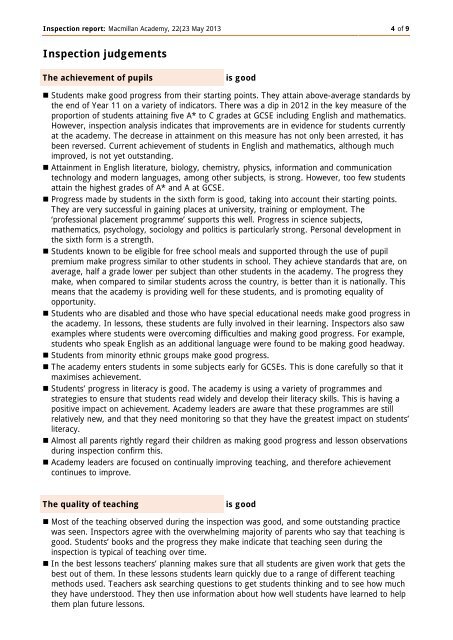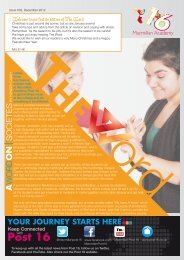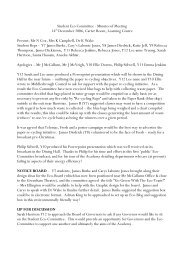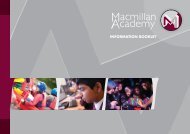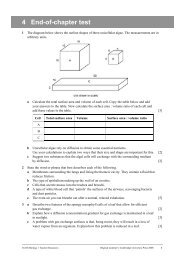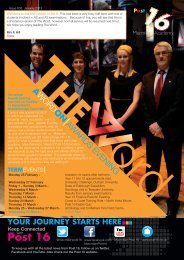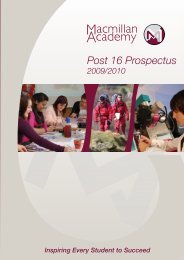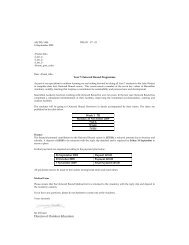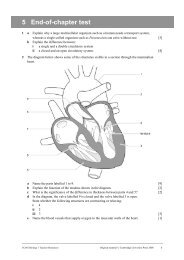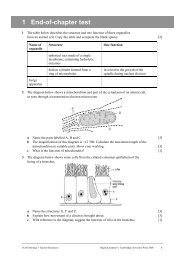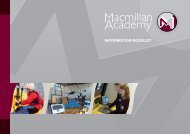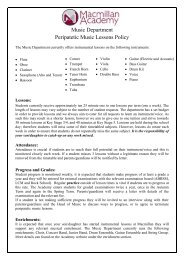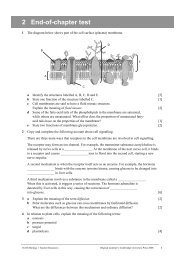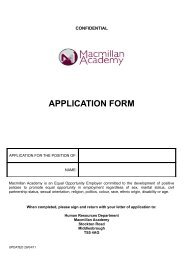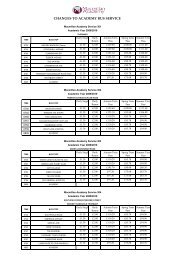Ofsted Report - Macmillan Academy
Ofsted Report - Macmillan Academy
Ofsted Report - Macmillan Academy
You also want an ePaper? Increase the reach of your titles
YUMPU automatically turns print PDFs into web optimized ePapers that Google loves.
Inspection report: <strong>Macmillan</strong> <strong>Academy</strong>, 22(23 May 2013 4 of 9<br />
Inspection judgements<br />
The achievement of pupils<br />
is good<br />
• Students make good progress from their starting points. They attain above-average standards by<br />
the end of Year 11 on a variety of indicators. There was a dip in 2012 in the key measure of the<br />
proportion of students attaining five A* to C grades at GCSE including English and mathematics.<br />
However, inspection analysis indicates that improvements are in evidence for students currently<br />
at the academy. The decrease in attainment on this measure has not only been arrested, it has<br />
been reversed. Current achievement of students in English and mathematics, although much<br />
improved, is not yet outstanding.<br />
• Attainment in English literature, biology, chemistry, physics, information and communication<br />
technology and modern languages, among other subjects, is strong. However, too few students<br />
attain the highest grades of A* and A at GCSE.<br />
• Progress made by students in the sixth form is good, taking into account their starting points.<br />
They are very successful in gaining places at university, training or employment. The<br />
‘professional placement programme’ supports this well. Progress in science subjects,<br />
mathematics, psychology, sociology and politics is particularly strong. Personal development in<br />
the sixth form is a strength.<br />
• Students known to be eligible for free school meals and supported through the use of pupil<br />
premium make progress similar to other students in school. They achieve standards that are, on<br />
average, half a grade lower per subject than other students in the academy. The progress they<br />
make, when compared to similar students across the country, is better than it is nationally. This<br />
means that the academy is providing well for these students, and is promoting equality of<br />
opportunity.<br />
• Students who are disabled and those who have special educational needs make good progress in<br />
the academy. In lessons, these students are fully involved in their learning. Inspectors also saw<br />
examples where students were overcoming difficulties and making good progress. For example,<br />
students who speak English as an additional language were found to be making good headway.<br />
• Students from minority ethnic groups make good progress.<br />
• The academy enters students in some subjects early for GCSEs. This is done carefully so that it<br />
maximises achievement.<br />
• Students’ progress in literacy is good. The academy is using a variety of programmes and<br />
strategies to ensure that students read widely and develop their literacy skills. This is having a<br />
positive impact on achievement. <strong>Academy</strong> leaders are aware that these programmes are still<br />
relatively new, and that they need monitoring so that they have the greatest impact on students’<br />
literacy.<br />
• Almost all parents rightly regard their children as making good progress and lesson observations<br />
during inspection confirm this.<br />
• <strong>Academy</strong> leaders are focused on continually improving teaching, and therefore achievement<br />
continues to improve.<br />
The quality of teaching<br />
is good<br />
• Most of the teaching observed during the inspection was good, and some outstanding practice<br />
was seen. Inspectors agree with the overwhelming majority of parents who say that teaching is<br />
good. Students’ books and the progress they make indicate that teaching seen during the<br />
inspection is typical of teaching over time.<br />
• In the best lessons teachers’ planning makes sure that all students are given work that gets the<br />
best out of them. In these lessons students learn quickly due to a range of different teaching<br />
methods used. Teachers ask searching questions to get students thinking and to see how much<br />
they have understood. They then use information about how well students have learned to help<br />
them plan future lessons.


